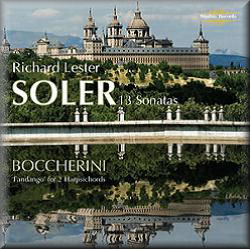|

Support us financially by purchasing
this disc through MusicWeb
for £12 postage paid world-wide.

|
Antonio SOLER (1729-1783)
13 Sonatas
Sonata in D, R.86 [5:40]
Sonata in D minor, R.24 [4:49]
Sonata in C sharp minor, R.21 [6:14]
Sonata in D flat, R.110 [4:23]
Sonata in A minor, R.118 [3:29]
Sonata in C minor, R.19 [2:55]
Sonata in C, M.27 [9:00]
Sonata in F, R.56 [7:10]
Sonata in D, R.92d [5:40]
Sonata in D minor, R.39 [3:04]
Sonata in G minor, M.38 [5:54]
Sonata in D, R.74 [4:53]
Sonata in G, R.43 [3:47]
Luigi BOCCHERINI (1743-1805)
Fandango (from: Guitar Quintet in D, G.448), transcr. for two harpsichords*
[5:46]
Richard Lester (harpsichord)
David Ponsford (harpsichord II*)
rec. no details given (compilation). DDD
NIMBUS NI5906 [72:49]
Antonio Soler's star is definitely waxing these days, at least
as far as recordings go, with a good quantity of recent monographs
across many labels. Some of these are single volumes in cycles currently
in hand. Examples include Pieter-Jan Belder's on Brilliant
Classics or the multi-artist project on Naxos - this latter more controversially
using a modern piano. Others take a similar approach to Richard Lester
here, serving up a choice selection of fruity, quirky, virtuosic Soler.
In his notes Lester assigns all the sonatas in his recital to one
of three categories, not always in jargon-free language: those of
a dance-like nature with "echoes of the guitar punteado and rasgueado
styles", those approximating the new Galant style of the time,
and those which "are slower and more vocal in nature [...] with
a hint of the melismatic expression found in cante hondo".
Soler was influenced by Domenico Scarlatti, an honorary Iberian whose
own five-hundred-plus keyboard sonatas are much better known. Anyone
who enjoys Scarlatti's sonatas will find much to entertain
and surprise in the mere 200-odd written by Soler, who was in many
respects a more adventurous keyboardist - "the devil in monk's
clothing", as one moniker had it - and arguably the greater composer.
Certainly there are few if any better advocates for these pieces than
Lester, a composer's musician who plays without cliché or affectation,
his open-toed scholarliness striking just the right course between
precision and warmth, pizzazz and coherence, devil and monk.
Unlike Soler, the slightly younger Luigi Boccherini did not write
a fandango - or anything much, for that matter - for harpsichord.
The one heard here is Lester's own arrangement for two instruments
of the final movement of the guitar quintet in D, G.448 - mildly entertaining,
but not a patch on the original. Lester's account of Soler's
much-recorded Fandango is on another Nimbus disc, where he shares
the programme with Portuguese composer Carlos Seixas, born a generation
earlier than Soler (NI 5836).
Sound and technical quality are up to Nimbus's usual high standards,
with minor variation in what is after all a compilation.
The booklet is fairly concise, with more information about harpsichord
secondo David Ponsford than Boccherini, but generally covers as much
ground as the non-specialist listener will require, including a brief
description of the various instruments heard in this recording. Ponsford
is lucky enough to own the two period replicas used for the Boccherini
recording.
Byzantion
Collected reviews and contact at artmusicreviews.co.uk
|



 All Nimbus reviews
All Nimbus reviews








